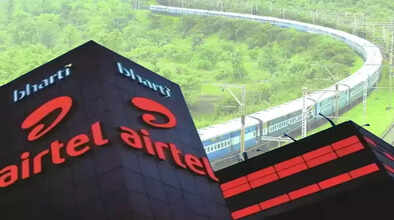Airtel: Airtel will now protect Indian Railways from cyber attacks! Learn how you can benefit..

Did you know that Indian Railways doesn't just run trains, it's also the country's largest digital network? Every day, millions of people travel by train, millions of tickets are booked, and billions of tons of freight are transported—all digitally. Therefore, protecting this vast network from hackers and cyberattacks is crucial. The good news is that Airtel Business has now partnered with Indian Railways. Airtel will secure Indian Railways' entire digital system from cyberattacks, a significant benefit to all of us.
What is this deal?
Airtel Business has received a major contract from the Indian Railways Security Operations Center (IRSOC). Simply put, Airtel will now build a robust "cyber fortress" for the Railways, protecting its digital systems from adversaries (i.e., cyber attackers) 24 hours a day, seven days a week, 365 days a year. This will be a security shield that will keep Indian Railways' entire IT system secure and ensure all digital operations run smoothly.
What benefits will we gain?
Consider that more than 20 million people travel on Indian Railways every day, and millions of digital transactions take place. This security shield will directly benefit more than 1 billion Indians:
Secure ticket booking: Now your ticket booking and payment information will be more secure than ever before.
Easy and secure payments: You'll have no worries when making online payments.
Train tracking and other services: Train information and other digital services will also be more secure and reliable.
Why is this so important?
Cyber attacks have increased significantly these days. Hackers constantly try to steal sensitive information such as people's identities, payment information, ticket data, and train movements. An attack on a large and critical system like Indian Railways could be extremely detrimental to the country. Therefore, it is crucial to keep this massive data flow secure.
What will Airtel do?
Airtel Business will develop multi-layered security to protect the Railways' vast database. This security will be so robust that:
It will secure all digital operations of approximately 160,000 employees spread across 26 different locations. It will utilize the best and most modern technology.
This will also include some 'Make in India' cybersecurity products, which will be built in compliance with Indian laws and provide security with the help of AI (Artificial Intelligence).
What did Airtel Business CEO, Sharat Sinha, say?
Sharat Sinha said that with cyber threats on the rise, modern security is crucial for the Railways' continued operations, data security, and passenger safety. He said, "We are honored that IRSOC has trusted Airtel to secure India's vast and complex railway network. This new security layer will make everything from ticket booking to data management more secure, providing a safe and seamless digital experience for millions of passengers."
What did Dilip Kumar of the Railway Board say?
Dilip Kumar explained that the Railways now relies heavily on digital technologies for everything, making cybersecurity crucial. The establishment of IRSOC will create a central security center that will continuously monitor railway assets, detect, and prevent threats. This will improve services and protect passenger safety.
Airtel Secure Key Features (What You Get):
Control everything from one place: A dashboard will be created to monitor all operations and security equipment at over 26 locations simultaneously and instantly.
Advanced Device Security: All railway devices, including your mobile phone and computer, will be continuously monitored and secured using AI.
Identification and Remediation of Vulnerabilities: Over 190,000 critical railway systems will be monitored from a single screen, ensuring immediate detection and remediation of any vulnerabilities or issues.
Next-generation monitoring: Using machine learning and AI, threats will be predicted, identified, and resolved in less than 20 seconds – the fastest in the industry.
Early threat detection: Cyberattacks will be detected and prevented before they impact the business. This will also include monitoring the dark web.
Strong network and access control: Security measures such as firewalls, routers, and passwords will be implemented to protect critical applications.
Disclaimer: This content has been sourced and edited from Zee Business. While we have made modifications for clarity and presentation, the original content belongs to its respective authors and website. We do not claim ownership of the content.

